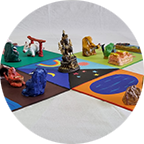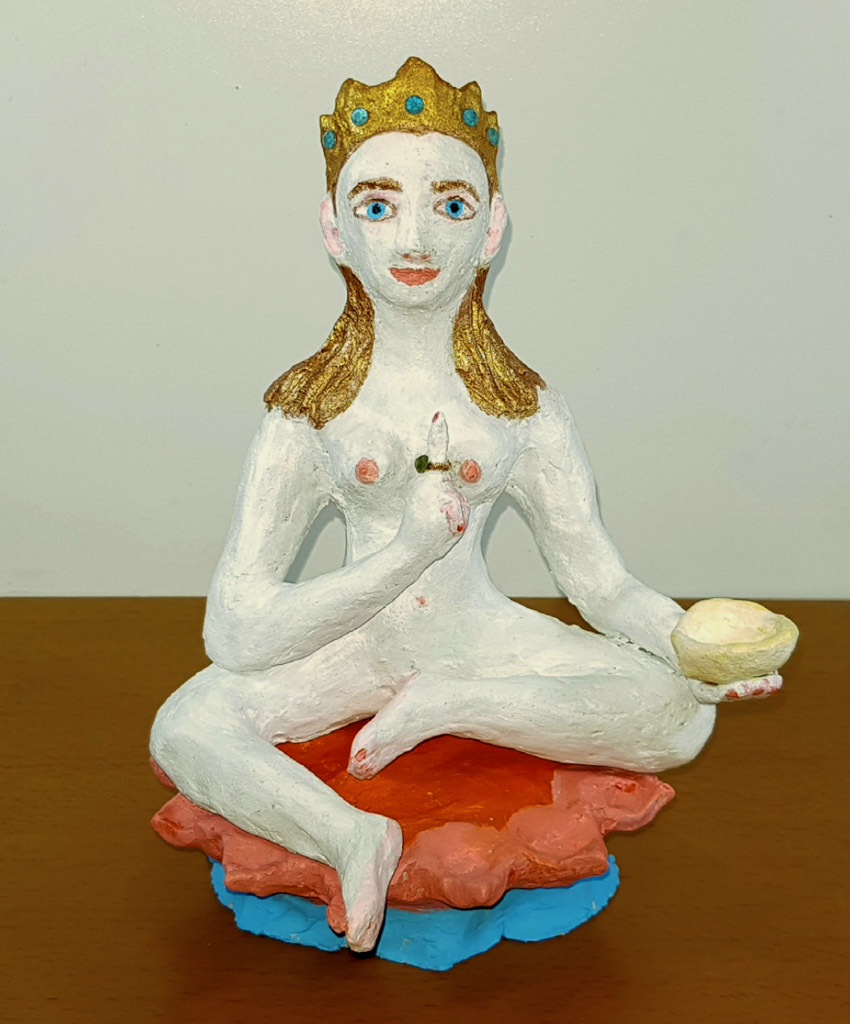Author: Vladimir Pyatsky
Translation: Natasha Tsimbler
When I worked as an orderly in a hospital, I spent much time contemplating Green Tara. In the pantheon of Buddhist deities, Green Tara is a savior and a source of comfort, rescuing beings from eight types of misfortune, which manifest as eight worldly states of mind:
- The pursuit of wealth
- The fear of poverty
- The pursuit of fame
- The fear of insignificance
- The pursuit of praise and approval
- The fear of blame for one’s wrongdoings
- The pursuit of fleeting sensual pleasures
- The fear of encountering unpleasant experiences
These eight worldly states shackle the mind, depriving it of peace and wisdom. In this way, they are the true sources of misfortune.
For the meditator, images of deities are symbolic manifestations of the highest qualities of one’s own mind. Deities are not personalities but diverse manifestations of a single wisdom. Contemplation of deities is a choice of freedom to see the presence of the light of wisdom and hope even in the most chaotic and terrifying aspects of life.
Through proper visualization of Green Tara, the mind is freed from delusion by discerning the true nature of phenomena. One day, as my mind rested in a prolonged and deep state of inner peace, I saw the goddess’s clear green light and received her direct teachings on the process of dying. These insights continued to unfold over the years, deepening and becoming clearer with time.
When the body is abandoned by the great element of space, consciousness is lost. Breathing and heartbeat may momentarily stop – this is the first sign of the process of dying. Knowing this, one realizes that wealth and possessions are nothing more than ghosts of a fading self.
When the body is abandoned by the great element of air, agony begins. It is like battling an imagined enemy, only to discover that the enemy is oneself. This is the experience of dying. Understanding this, one renounces senseless hostility toward others, recognizing it as an internal agony of the self.
When the body is abandoned by the great element of fire, death occurs. The body cools and becomes like wood or stone. Knowing this, one ceases to demand love, warmth, or care from others. One realizes that the self, craving care and attention, is merely a puppet, insensible to the very things it desires.
When the body is abandoned by the great element of water, decay sets in, and the corpse decomposes. Water binds the body’s elements, and in its absence, the body disintegrates. Knowing this, one lets go of the craving for fame and the fear of insignificance. One realizes that the body is composed of nothing but impurities and that there is nothing in it worthy of glorification, nothing that can be made truly significant.
When the body is abandoned by the great element of earth, it disappears entirely. The bones, no longer bound together, turn to dust. Understanding this, one lets go of the attachment to sensual pleasures and the fear of their loss, seeing them simply as ashes swept up by the wind of desire.
Author
Author: Vladimir Pyatsky
Translation: Natasha Tsimbler
When I worked as an orderly in a hospital, I spent much time contemplating Green Tara. In the pantheon of Buddhist deities, Green Tara is a savior and a source of comfort, rescuing beings from eight types of misfortune, which manifest as eight worldly states of mind:
- The pursuit of wealth
- The fear of poverty
- The pursuit of fame
- The fear of insignificance
- The pursuit of praise and approval
- The fear of blame for one’s wrongdoings
- The pursuit of fleeting sensual pleasures
- The fear of encountering unpleasant experiences
These eight worldly states shackle the mind, depriving it of peace and wisdom. In this way, they are the true sources of misfortune.
For the meditator, images of deities are symbolic manifestations of the highest qualities of one’s own mind. Deities are not personalities but diverse manifestations of a single wisdom. Contemplation of deities is a choice of freedom to see the presence of the light of wisdom and hope even in the most chaotic and terrifying aspects of life.
Through proper visualization of Green Tara, the mind is freed from delusion by discerning the true nature of phenomena. One day, as my mind rested in a prolonged and deep state of inner peace, I saw the goddess’s clear green light and received her direct teachings on the process of dying. These insights continued to unfold over the years, deepening and becoming clearer with time.
When the body is abandoned by the great element of space, consciousness is lost. Breathing and heartbeat may momentarily stop – this is the first sign of the process of dying. Knowing this, one realizes that wealth and possessions are nothing more than ghosts of a fading self.
When the body is abandoned by the great element of air, agony begins. It is like battling an imagined enemy, only to discover that the enemy is oneself. This is the experience of dying. Understanding this, one renounces senseless hostility toward others, recognizing it as an internal agony of the self.
When the body is abandoned by the great element of fire, death occurs. The body cools and becomes like wood or stone. Knowing this, one ceases to demand love, warmth, or care from others. One realizes that the self, craving care and attention, is merely a puppet, insensible to the very things it desires.
When the body is abandoned by the great element of water, decay sets in, and the corpse decomposes. Water binds the body’s elements, and in its absence, the body disintegrates. Knowing this, one lets go of the craving for fame and the fear of insignificance. One realizes that the body is composed of nothing but impurities and that there is nothing in it worthy of glorification, nothing that can be made truly significant.
When the body is abandoned by the great element of earth, it disappears entirely. The bones, no longer bound together, turn to dust. Understanding this, one lets go of the attachment to sensual pleasures and the fear of their loss, seeing them simply as ashes swept up by the wind of desire.

